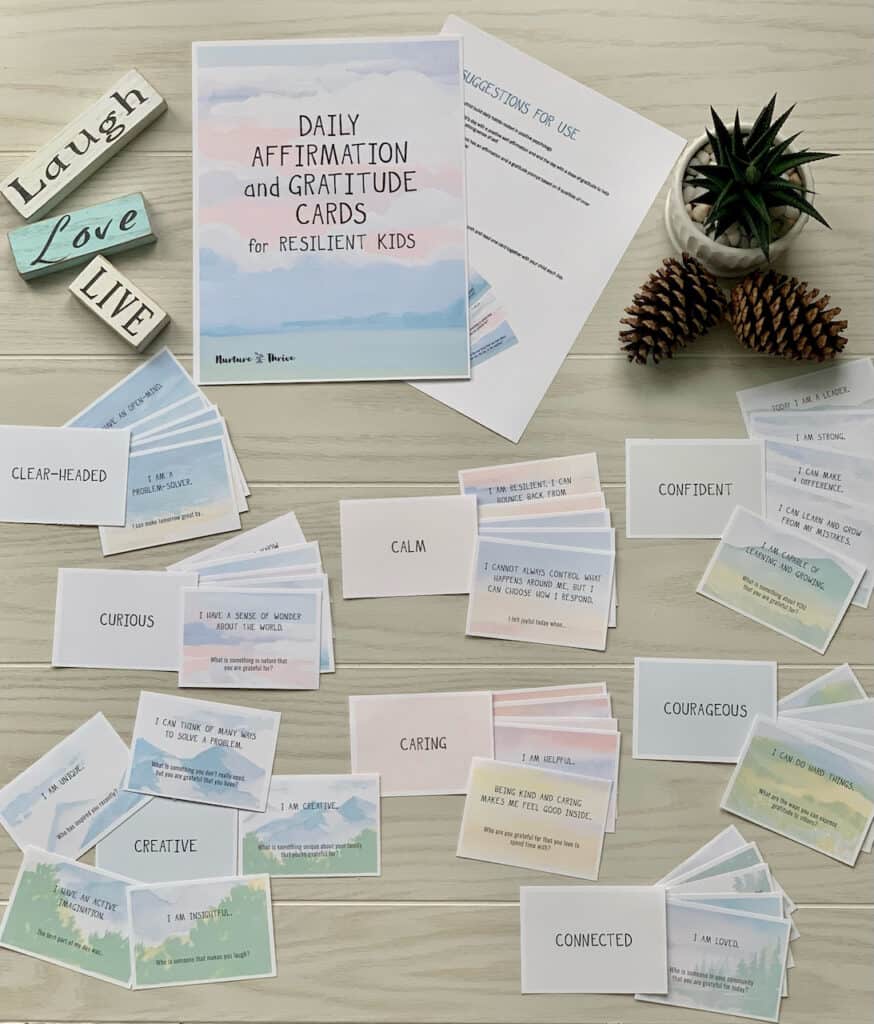Inside: According to several studies, positive affirmations help children build their inner self-confidence and self-esteem. However, it is important to focus on core values instead of simply positive thoughts. Here are 40 positive affirmations that will help your child build inner strength and resilience.
What Positive Affirmations Are (And Are Not) According to Science
Positive affirmations are ideas or activities that affirm who you are as a person. This is often in terms of what your abilities are, what you value, and who you are in terms of your relationships. According to scientists, positive affirmations are self-awareness and perspective on what really matters to you (source).
One important distinction made by scientists is that positive affirmations are not simply saying positive things about yourself or building false self-esteem but instead are the ability to re-center on your values, what is important to you, and what really matters to who you are as a person — your core self.

Building Up Your Child’s Inner Strength and Positive Mindset With Positive Affirmations
What messages are we giving our kids about their core selves? Are we building their inner strength by encouraging them to have a compassionate inner voice, to be curious, and to be courageous? Or are we equating their emotional reactions and their behavior to who they are as a person?
Whether we realize it or not, we are teaching them about their core self all of the time. And they are getting those messages elsewhere as well. Too often, kids can get stuck in negative thought patterns and negative self-talk.
Starting a daily positive affirmation habit can boost up your child’s sense of who they are as a person, and what they value, and create a foundation for self-love that will stick with them throughout their lives.
Research has also shown that positive affirmations can protect against that negative voice by buffering stress. Participants who affirmed their values before the task had significantly lower cortisol responses to stress, compared with control participants (source).
Creating a routine by doing daily affirmations is a way you can help protect your child from the negative effects of stress.
Experiencing some challenges teaches important life lessons, however, we all know that kids can easily internalize failures and negative thoughts. Think of positive affirmations as a powerful tool to bolster their inner strength so they can learn from challenges without affecting their inner voice and sense of who they are as a person.
Related: How to Help Your Child Turn Negative Self-Talk into Self-Kindness
How Positive Affirmations Support Emotions and Help Reduce Anxiety in Kids
Building up your child’s sense of who they are as a person is a key to understanding that emotions are just one part of them. Emotions don’t define who they are — emotions come and go, change, and can be fleeting.
Who they are at their center is something they can come back to again and again. This awareness of the inner self or core self is a kind of consciousness of being. Whether you call it awareness, meta-cognition, or consciousness, really it is an act of regulation. It is the part of us that does the regulating. It is the core self or some would even say, the soul. However you define it, that inner awareness is a foundation for mental health and well-being.
According to studies, affirmations engage parts of the brain that are associated with positive valuation, self-processing, and rewards — especially in thinking about the future. Affirmations that focus on what you want to do, be or become are much more successful than focusing on the past.
Richard C. Schwartz, Ph.D., developed the Internal Family Systems model as a therapeutic model to help clients think about their core self. One of the things Dr. Schwartz noticed in his clients was that when they were experiencing growth or self-healing they were often drawing on their core self.
He defined the core self or the self-energy as having compassion, openness, and confidence. We know from other research that people who score high in these personality traits are more likely to engage in positive thinking, succeed in life, and have higher well-being.
Dr. Schwartz elaborated on the core self or energy as having eight main components known as the 8 Cs: Curiosity, Calmness, Clarity, Courage, Connectedness, Confidence, Creativity, and Compassion.
Positive Affirmation for Kids based on the 8C’s of Inner Strength and The Core Self
Scientists have made an important distinction that positive affirmations are not simply generic positive statements and false self-esteem but rather an affirmation of your core values (source).
I’ve adapted these from Dr. Scwarz’s original 8 to be more kid-friendly. These are the definitions of the 8C’s of the core self, or as he called them, self-energies.
- Confident – I Believe that I can have an effect on my surroundings and that I can do hard things. I believe that I can learn and grow stronger from my mistakes.
- Curious – I am interested in the world around me, and I have a sense of wonder about how things work and how other people feel and think.
- Calm – I cannot always control what happens around me, but I can choose how I respond. If I am upset, I know I can come back to a place of calmness.
- Courageous – I want to try new things and hard things, even if I sometimes feel a little scared. I know deep down I am a strong person.
- Creative – I have a strong imagination, and I can come up with new ideas. I can think of ways to solve problems.
- Caring – I care about how other people feel. I like to help people, and I like to be kind. Being kind and caring makes me feel good.
- Connected – I am connected to people who care about me and who I care about. I can show the people I care about my true colors and who I am.
- Clear-Headed – I can think through the steps to solve a problem. I have an open mind.
Read more about the 8C’s and core self as well as a way to introduce this to your child here.

How to Start a Daily Affirmation Practice With Your Child – 5 Keys for Success
- Start with the idea that your child has a core self and explain that scientists think there are about 8C’s that make up that core self — however, some scientists have found even more. Having a multi-dimensional sense of self fosters resilience (source).
- Identify the authentic values that resonate most with your child. Which of the 8C’s resonate the most with your child? Maybe they value and identify with creativity and compassion the most. Perhaps they think of themselves as curious and caring. Whichever resonates the most with your child is where you should start your daily affirmation habit.
- Create a daily routine or habit that reinforces positive affirmations. Start your child’s days with morning affirmations. This is a great way to fit it into your day and to make sure each day gets off to a fresh start. Help your child take a few deep breaths to get centered, and then they can write, say, or choose an affirmation that resonates the most with them at that moment.
- Pair it with a Gratitude Practice. Research shows a daily gratitude practice contributes to feelings of well-being and a positive outlook. In fact, studies show that daily gratitude can rewire the brain to be happier (source).
- Use Visual Tools and Affirmation Cards. I have created positive affirmation and gratitude cards based on the 8C’s that your child can use daily — to learn more, visit this link.
40 Science-Based Positive Affirmations and Gratitude Cards For Resilient Kids
Start your child’s day with a positive self-affirmation and end the day with a dose of gratitude to help them develop a strong sense of self, reduce negative thinking, and buffer stress.
Each card in this deck has an affirmation and a gratitude prompt based on 8 qualities of inner strength and resilience, the 8 Cs: Curiosity, Calmness, Clarity, Courage, Connectedness, Confidence, Creativity, and Compassion.
Shuffle the deck at the beginning of each month and read one card together with your child each day.
Ask them which are their favorite affirmations and which of the 8C’s resonates the most with them.
Starting a daily positive affirmation habit can boost your child’s sense of who they are as a person and what they value and create a foundation for self-love that will stick with them throughout their lives.
This card set is based on the science of affirmations and gratitude. Help your child build daily habits rooted in positive psychology with this instant download set of affirmation and gratitude cards. Get your set here.
What to do next…
1. Get advice from Dr. Ashley Soderlund sent right to your inbox. ❤︎
2. Emotional and mental wellness begins at home.
Get the tools you need in my shop! You can instantly download and print digital printables to foster connection, emotion regulation, and more! Check out the Nurture and Thrive Shop.


 How to Foster a Love of the Outdoors in Your Kids: 5 Nature Walk Activities
How to Foster a Love of the Outdoors in Your Kids: 5 Nature Walk Activities